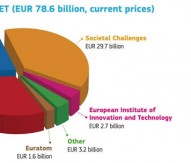
PROFILE: A centre of excellence
The Institute of Polymers (IP-BAS) in Bulgaria focuses on the development of polymer research, and, as project co-ordinator Dr Neli Koseva discusses, to utilise the findings into materials and products for industry and society.
The Institute of Polymers (IP-BAS) belongs to the Nanosciences, New Materials and Technologies Division of the Bulgarian Academy of Sciences. The mission of IP-BAS is to do advanced research on polymers and polymer materials and to transform the generated knowledge into innovative materials, products, technologies and services in response to the needs of industry and society.
The principal scientific strength of IP-BAS is the vast knowledge associated to various methods for polymer synthesis. The research on precise synthesis, modification and characterisation of polymers and development of new polymer materials creates a strong knowledge basis for front line and application oriented research. Some of the areas which the investigations focus on are detailed below.
Materials for pharmacy and medicine
IP-BAS is a Centre of Excellence for new polymer materials for medicine and pharmacy. The targeted results are a favourable environment for intensifying the research and, using the knowledge generated, the education of PhD students as well as promoting the professional level of the researchers, etc. The achievements of IP-BAS in that interdisciplinary field include polymer-based systems for controlled drug delivery and wound healing, polymer-drug conjugates, new therapeutic systems based on polyphosphoesters, ‘smart’ nanoparticles for targeted drug delivery, stimuli-responsive hydrogels and self assembled structures, stabilised micelles and liposomes, nanofibrous and nanohybrid materials, etc.
Materials for biotechnology, agriculture and food preservation
New polymer materials for immobilisation of enzymes or microorganism used to increase the effectiveness of the biotechnological processes have been developed. Polymer-based phytosanitary products and polymer-agrochemical conjugates have been designed as modern and ecologically oriented materials for agriculture. In addition, biodegradable packages and polymer materials from renewable sources are being developed.
Electroconductive and photoactive materials
Various electrically conducting bulk polymer nanocomposites or thin films were fabricated for applications in electrostatic dissipation, electromagnetic interference (EMI) shielding, or organic solar cells. New photoactive systems were developed that can be exploited as light-harvesting antennas for solar energy conversion.
Materials for energy and environmental purposes
Investigations which have been performed have resulted in polyelectrolyte membranes for middle and high temperature fuel cells, polymer-based sensors and adsorbents for environmental pollutants, polymeric membranes for potential technological applications in environmental monitoring and wastewater purification; flame resistant polymer materials.
IP-BAS has established fruitful collaborations with prominent research centres in the country and abroad. The institute carries out intensified joint investigations with organisations specialised in fields other than polymer science such as medicine, pharmacy, biotechnology, agriculture, etc., that have resulted in a number of interdisciplinary projects. IP-BAS is a co-founder of the Central and East European Polymer Network, which is an informal association of polymer institutes and polymer groups affiliated to national academies of sciences in eight Central and Eastern European countries.
Since 1 October 2012, IP-BAS has been focusing on strengthening the research capacity and innovation potential of the Institute of Polymers at the Bulgarian Academy of Sciences (POLINNOVA). It is a 42-month project granted financing by the EC within the FP7 ‘Capacities – Research Potential’ Programme (GA No 316086). The main goal of the project is to strengthen the IP-BAS research and innovation potential in the field of advanced polymer materials and to build its capacity of a regional leader participating successfully in activities at European Union level. The key concept is to implement an action plan, derived from a complete SWOT analysis and synchronised with the specific objectives of the call (FP7-REGPOT-2012-2013-1).
The activities of the POLINNOVA project include:
- Twinning with leading European research centres through an exchange of knowledge, experience and know-how aims at intensifying the joint research and increasing the density of networking with organisations highly experienced and knowledgeable in specific areas of polymer materials. That will improve and diversify the qualification of the research staff stimulating the transnational and transdisciplinary mobility. The programme of exchange is realised with the six twinning research organisations;
- The reinforcement of human resources is achieved by recruitment of experienced researchers and technicians. In parallel to the increasing of IP-BAS human potential, the project is facing the problem of brain drain. In this context, experienced Bulgarian scientists who relate their future and carrier development with return home are a targeted group;
- Enhancement of the research infrastructure is focused on the development of the S&T capacities for innovative research in the polymer opportunity areas by upgrading the existing technical equipment and acquisition of new modules and instruments. The modernised scientific infrastructure is providing opportunities to benchmark with the research standard of leading centres in EU;
- Unlocking the innovation capacity of IP-BAS will be achieved by an education and training scheme in entrepreneurship and innovation management, exchanging experiences with the twinning organisations and adopting good practices in the commercialisation of research results, encouraging comprehensive stakeholder debates on innovations involving scientists, industry, consumers and public authorities. A strategic plan for intellectual properties development and building the innovation capacity of IP-BAS will be prepared;
- Dissemination and communication activities increase the visibility of IP-BAS excellence and the awareness of society about its achievements by dissemination, marketing and promotion of IP-BAS results and the added value of the project. The dissemination and communication activities aim to reach out to interested parties from academic circles, industry, stakeholders as well as the general public; and
- Evaluation of IP-BAS research potential and innovation capacities upon POLINNOVA completion will provide an evaluation analysis by international independent experts of the overall research quality and innovation potential (including management and research infrastructures) at the end of the POLINNOVA project. That will also indicate the path to improved IP-BAS research faculties for increased contribution to regional economic and social development. The ex-post evaluation will facilitate the actualisation of the action plan for IP-BAS sustainable progress in advanced polymer materials research, development and innovations. That will also extend the positive impact of the POLINNOVA project.
The POLINNOVA project is being realised in co-operation with six partnering organisations having an internationally recognised high level scientific background in polymer science, considerable knowledge in the relevant fields and also significant experience in EU projects.

Dr Neli Koseva
Project Co-ordinator
+359 297 96630





